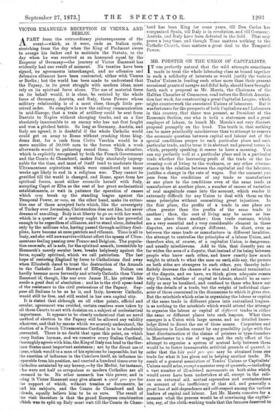VICTOR EMANUEL'S RECEPTION IN VIENNA AND BERLIN.
A PART from the extraordinary picturesqueness of the event—which, as it were, ends an Italian cycle, stretching from the day when the King of Piedmont swore to avenge his father and to maintain the Statuto, to the day when he was received as an honoured equal by the Emperor of Germany—the journey of Victor Emanuel has evidently had one result of moment. No treaties have been signed, no agreements interchanged, and no offensive and defensive alliances have been contracted, either with Vienna or Berlin ; but the world has been made to understand that the Papacy, in its great struggle with modern ideas, must rely on its spiritual force alone. The use of material force on its behalf would, it is clear, be resisted by the whole force of Germany, Austria, and Italy, three Powers whose military relationship is of a most close, though little per- ceived order. So complete is now the railway communication in mid-Europe, that a train of artillery could be sent from Dantzic to Naples without changing trucks, and on a line absolutely inaccessible to an enemy who has not first fought and won a pitched battle. So long as Germany, Austria, and Italy are agreed, it is doubtful if the whole Catholic world could get an army to Rome without crushing three king- doms first, for a rush from Civita Vecchia would be a mere sacrifice of 50,000 men to the forces which a week afterwards would be gathering round them. This situation, which is explicitly recognised by both the French Government and the Comte de Chambord, makes Italy absolutely impreg- nable-for the time, and must of itself tend to moderate those Ultramontane aspirations which were considered not many weeks ago likely to end in a religious war. They cannot be gratified till the world is changed, and Rome, apart from her spiritual forces, must either reconcile herself with Italy, aocepting Capri or Elba as the seat of her great ecclesiastical establishments, or wait in patience the operation of causes which may break up the standing league against the Temporal Power, or may, on the other hand, make its extinc- tion one of those accepted facts which, like the sovereignty of Turkey over Jerusalem, Christendom does not like, but never dreams of annulling. Italy is at liberty to go on with her work, which in a quarter of a century ought to make her powerful enough to be regardless of alliances, and to stand alone, defended only by the millions who, having passed through military disci- pline, have become at once patriots and riflemen. Time is all to Italy,and she will novesurvive without effort the spasm of Ultra- montane-feeling passing over France and Belgium. The popula- tion once safe, all is safe, for the-spiritual assault, irresistible by Bismarck's merely secular laws, breaks helplessly against the force, equally spiritual, which we call patriotism. The last hope of restoring England by force to Catholicism died away when Elizabeth dared to trust the destruction of the Armada to the Catholic Lord Howard of Effingham. Italian can hardly become more fervently and utterly Catholic than Victor Emanuel 4, though, like our own James IL, his private life needs a good deal of absolution ; and he is the civil spear-head of the resistance to the civil pretensions of the Papacy. Sup- pose all Italians to be as he is, and Italy, however Catholic, would still be free, and still seated in her own capital city. It is stated, that although on• all other points, official and secular, agreement was avoided, certain resolves were taken by all three Courts to act with decision on a.subject of ecclesiastical importance. It appears to be clearly understood that no novel method of election to the Papacy will' be'allowed any validity whatever, and that by means which we scarcely understand, the election of a- French Ultramontane Cardinal is to be absolutely prevented. There is no doubt that upon this points on which every Italian layman, and we conceive every Italian, Cardinal, thoroughly agrees with him, the.King of Italy can lend to the Ger- man States most important assistance ; not by the direct use of force, which would to a man of his opinions be impossible, but by the exertion of influence -in the Conclave itself, an: influence in- separable from his:position, and exerted a hundred times over by Catholics untainted by any heresy;—.by the Medici, for instance, who were not half so scrupulous as modern Catholics are all assumed to be. No other monarch has this power, and in using it ViotorlImanuel may ,give almost a, quid pro quo for the support of which, without treaties. or documents, he and his subjects, and the Comte de Chambord and his friends, equally believe him to be so sure. The result of the visit therefore is that the grand. European combination which was-to split up Italy must wait till the Comte de Cham- bord has been King for some years, till Don Carlos has reorganised Spain, till Italy is in revolution, and till Germany, Austria, and Italy have been defeated in the field. That may prove a long time, and though Time matters nothing to the Catholic Church, time matters a great deal to the Temporal Power.


































 Previous page
Previous page